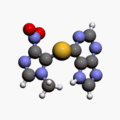Immunosuppression
| Immunosuppression | |
|---|---|
polyomavirus. Urine cytology specimen. | |
| ICD-10-PCS | D89.9 |
| MeSH | D007165 |
Immunosuppression is a reduction of the activation or efficacy of the immune system. Some portions of the immune system itself have immunosuppressive effects on other parts of the immune system, and immunosuppression may occur as an adverse reaction to treatment of other conditions.[1][2]
In general, deliberately induced immunosuppression is performed to prevent the body from
Deliberately induced


Administration of immunosuppressive medications or immunosuppressants is the main method for deliberately inducing immunosuppression; in optimal circumstances, immunosuppressive drugs primarily target hyperactive components of the immune system.[5] People in remission from cancer who require immunosuppression are not more likely to experience a recurrence.[6] Throughout its history, radiation therapy has been used to decrease the strength of the immune system.[7] Dr. Joseph Murray of Brigham and Women's Hospital was given the Nobel Prize in Physiology or Medicine in 1990 for work on immunosuppression.[8]
Immunosuppressive drugs have the potential to cause
Steroids were the first class of immunosuppressant drugs identified, though side-effects of early compounds limited their use. The more specific[
Non-deliberate immunosuppression

Non-deliberate immunosuppression can occur in, for example, ataxia–telangiectasia, complement deficiencies, many types of cancer, and certain chronic infections such as human immunodeficiency virus (HIV). The unwanted effect in non-deliberate immunosuppression is immunodeficiency that results in increased susceptibility to pathogens, such as bacteria and viruses.[1]
Immunodeficiency is also a potential adverse effect of many
B cell deficiency and T cell deficiency are immune impairment that individuals are born with or are acquired, which in turn can lead to immunodeficiency problems.[15] Nezelof syndrome is an example of an immunodeficiency of T-cells.[16]
See also
- Immunosuppressive drug
- Discovery and development of mTOR inhibitors
- BK virus
- Interleukin-2 immunotherapy
- B cell deficiency
- T cell deficiency
- Treatment methods for preventing organ rejection
References
- ^ a b "Immunodeficiency disorders: MedlinePlus Medical Encyclopedia". medlineplus.gov. Retrieved 2017-05-06.
- ^ "NCI Dictionary of Cancer Terms". National Cancer Institute. 2011-02-02. Retrieved 2017-05-06.
- ^ a b "Immunosuppression: Overview, History, Drugs". 2017-01-06.
{{cite journal}}: Cite journal requires|journal=(help) - ^ "NCI Dictionary of Cancer Terms". National Cancer Institute. 2011-02-02. Retrieved 2019-11-28.
- PMID 26170177.
- PMID 27039969.
- ISBN 9780323390279.
- ^ "Joseph E. Murray - Facts". www.nobelprize.org. Retrieved 2017-05-12.
- ^ "Immunosuppression". National Cancer Institute. 2015-04-29. Retrieved 2017-07-13.
- PMID 23248391.
- ^ "Transplant rejection: MedlinePlus Medical Encyclopedia". medlineplus.gov. Retrieved 2017-07-14.
- ^ "Immunology of Transplant Rejection: Overview, History, Types of Grafts". 2017-03-09.
{{cite journal}}: Cite journal requires|journal=(help) - ^ Charles A Janeway, Jr; Travers, Paul; Walport, Mark; Shlomchik, Mark J. (2001). "Responses to alloantigens and transplant rejection". Garland Science.
{{cite journal}}: Cite journal requires|journal=(help) - PMID 22379461.
- ^ "Immunodeficiency (Primary and Secondary). Information". patient.info. Retrieved 2017-07-13.
- ISBN 9780781730631. Retrieved 2 June 2017.
Further reading
- Boraschi, Diana; Penton-Rol, Giselle (2016-01-25). Immune Rebalancing: The Future of Immunosuppression. Academic Press. ISBN 9780128033364.Retrieved 6 May 2017.
- Thomson, A. W. (2001). Therapeutic Immunosuppression. Springer Science & Business Media. ISBN 9789401007658. Retrieved 6 May 2017.
